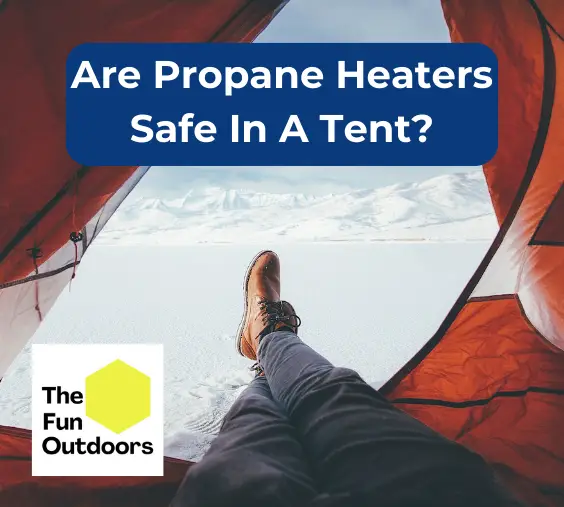Propane heaters are a popular choice for camping enthusiasts who want to stay warm during chilly nights. While propane heaters can provide warmth and comfort, they also pose certain risks that need to be taken into consideration. So are propane heaters safe in a tent?
It is safe to use a propane heater in your tent as long as it’s rated as indoor-safe, you have ensure good ventilation and never leave the propane heater unattended.
We’ve put together this guide that covers all the key features you should look for in a propane tent heater and some safety tips to follow.
Propane Heater In Tent: Key Safety Considerations
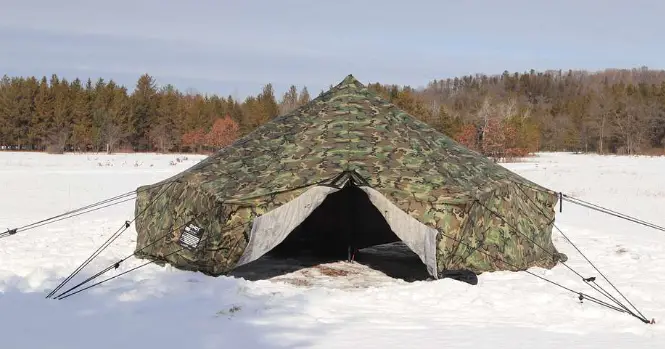
When using a propane heater in a tent, safety should always be a top priority. Here are some key safety considerations to keep in mind:
Labeled For Indoor Use
It is important to use a propane heater that is specifically designed for indoor use. These heaters have been tested and approved for use in enclosed spaces like tents and have safety features that are specifically designed for indoor use.
Tip Over Protection
Propane heaters should have a tip-over protection feature. This feature automatically shuts off the heater if it is accidentally knocked over, reducing the risk of fire.
Safety Guard
A safety guard is another important feature to look for in a propane heater. This guard protects the flame from being accidentally touched or bumped, reducing the risk of burns or catching something on fire.
Automatic Timer
An automatic timer is a useful feature that allows you to set the heater to turn off after a certain amount of time. This helps prevent overheating and reduces the risk of fire.
Push Ignition Button
A push ignition button is a convenient feature that allows you to easily start the heater without the need for matches or a lighter, making it safer.
Overheating Prevention
Propane heaters should have an overheating prevention feature. This feature automatically shuts off the heater if it begins to overheat, reducing the risk of fire.
Oxygen Depletion Sensor
An oxygen depletion sensor is a safety feature that automatically shuts off the heater if the oxygen level in the tent drops too low. This helps prevent carbon monoxide poisoning.
Carbon Monoxide Sensor & Limiting Features
A carbon monoxide sensor is another important safety feature to look for in a propane heater. This sensor detects the presence of carbon monoxide and automatically shuts off the heater if the level becomes too high.
Additionally, some propane heaters have limiting features that reduce the amount of carbon monoxide produced.
Ventless Efficient Burner
Finally, a ventless efficient burner is a feature that allows the propane heater to burn fuel more efficiently, reducing the amount of carbon monoxide produced. This feature also helps prevent the buildup of harmful gases in the tent.
Propane Heaters and Tents: 3 Key Guidelines
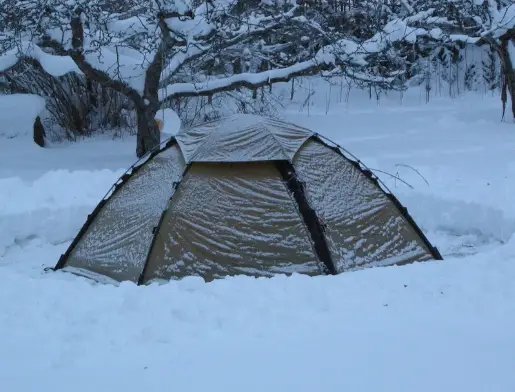
Propane heaters are a popular choice for campers who want to stay warm during chilly nights. However, there are certain safety concerns that need to be addressed before using them inside a tent. Here are some important things to keep in mind:
- Ventilation is crucial: Propane heaters produce carbon monoxide, which can be dangerous if it accumulates in a confined space. It is important to ensure that there is adequate ventilation in the tent to allow fresh air to circulate. This can be achieved by opening windows or vents, or by using a tent with mesh panels.
- Carbon monoxide detectors are a must: Even with proper ventilation, it is still important to have a carbon monoxide detector in the tent. This device will alert you if the levels of carbon monoxide become dangerous. It is recommended to use a detector that is specifically designed for use in tents.
- Choose the right size heater: It is important to choose a heater that is appropriate for the size of the tent. A heater that is too small will not provide enough warmth, while a heater that is too large can be dangerous and may produce excessive amounts of carbon monoxide. Check the manufacturer’s recommendations before purchasing a heater.
- Follow the manufacturer’s instructions: Always read and follow the manufacturer’s instructions carefully before using a propane heater in a tent. This will help ensure that the heater is used safely and effectively.
- Consider alternative heating options: While propane heaters are a popular choice, there are other options available that may be safer or more suitable for your needs. These include electric heaters, battery-powered heaters, and heated blankets.
See Related: How To Heat A Tent Without Electricity
Safety Tips for Using A Propane Heater In A Tent
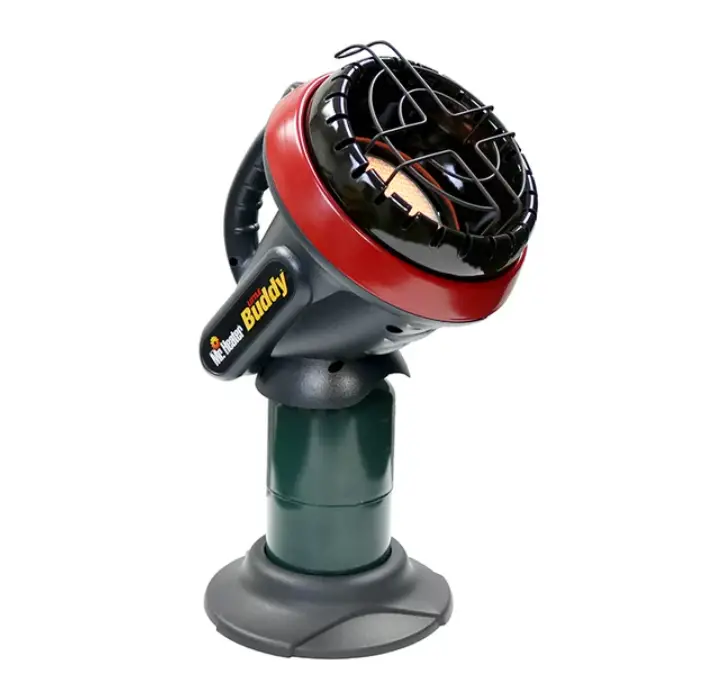
When camping in cold weather, a propane heater can be a lifesaver. However, it can also be dangerous if not used properly. Here are some safety guidelines to follow when using a propane heater in a tent.
Keep Your Heater Away From Other Objects
When using a propane heater in a tent, it’s important to keep it away from other objects. This includes walls, bedding, and anything else that could catch fire. Make sure there’s at least a three-foot clearance around the heater.
Start Your Propane Heater Outdoors
Before bringing your propane heater inside the tent, you should start it outdoors. This will help to prevent any buildup of carbon monoxide. Follow the manufacturer’s directions carefully when starting your propane heater.
Run Your Tent Heater On Low At First
When you first start your propane heater, run it on low heat for a few minutes before turning it up. This will help to warm up the tent gradually and prevent any sudden temperature changes.
Keep Flammable Stuff Away From Your Heater
Keep all flammable materials away from your propane heater. This includes clothing, bedding, and anything else that could catch fire. Make sure that your heater is on a stable surface, away from anything that could knock it over.
Keep Liquids Away From The Heater
Never place liquids near your propane heater. If a liquid spills and comes into contact with the heater, it could cause a fire or explosion.
Never Leave Your Heater Unattended
It’s important to never leave your propane heater unattended. Always keep an eye on it while it’s running. If you need to leave the tent, turn off the heater first.
By following these safety guidelines, you can safely use a propane heater in your tent. Remember to do your research and read the manufacturer’s directions carefully before using any camping equipment.
How To Use A Propane Heater In A Tent
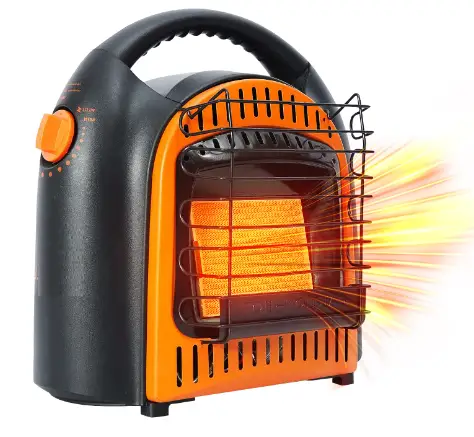
When camping in cold weather, a propane heater can be a great way to keep warm. However, it’s important to use them safely to avoid any potential risks. Here are some tips on how to use a propane heater in a tent.
Placement
When using a propane heater in a tent, it’s important to place it on a stable surface away from anything that could catch fire.
Never place the heater directly on the tent floor, as this can cause burns or damage to the tent. Instead, use a stable stand or a piece of plywood to provide a stable base for the heater.
Ensure Proper Tent Ventilation
Propane heaters produce carbon monoxide, which can be dangerous in an enclosed space like a tent. To avoid this, it’s important to ensure proper ventilation in the tent. This can be done by opening a vent or window to allow fresh air to circulate.
Supervision Is Key
Never leave a propane heater unattended in a tent. Always turn off the heater before leaving the tent or going to sleep.
Top Recommended Propane Heaters for Tents
When it comes to heating a tent during cold weather camping, propane heaters are a popular choice. However, not all propane heaters are created equal, and it’s essential to choose one that is safe, efficient, and suitable for your needs. Here are some of the top recommended propane heaters for tents:
Mr. Heater Buddy
Mr. Heater Buddy is a popular choice among campers, and for a good reason. This indoor-safe, portable propane heater is specifically designed for camping and is clean-burning, making it an excellent option for those concerned about carbon monoxide.
It comes in two sizes, the Little Buddy and the Big Buddy, with the Little Buddy being the more compact option for smaller tents.
BTU Output
When choosing a propane heater for your tent, it’s essential to consider the BTU output. The higher the BTU output, the more heat the heater can produce. However, a higher BTU output also means a higher fuel consumption rate, which can be a concern when camping. It’s essential to find the right balance between heat output and fuel efficiency.
Overall, when choosing a propane heater for your tent, it’s essential to consider safety, efficiency, and suitability for your needs. The above options are some of the top recommended propane heaters for tents, but it’s always a good idea to do your own research and choose a product that meets your specific requirements.
Alternatives to Propane Heaters
While propane heaters are a popular choice for heating tents, there are other options available that may be safer or more convenient for some campers.
Electric Heaters
Electric heaters are a good alternative to propane heaters if you have access to a power source. They are generally safer to use in a tent because they don’t produce carbon monoxide or open flames. However, they do require a power source, which may not always be available when camping.
Stove
A stove can also be used to heat a tent. While it may not be as efficient as a dedicated heater, it can still provide some warmth. You can use a camp stove or a backpacking stove to heat up water or food, and the heat from the stove can help warm up the tent. However, it’s important to make sure the stove is placed in a safe location and that the tent is well-ventilated to prevent carbon monoxide buildup.
See Related: The Best Winter Tents With Stoves
Natural Gas Heaters
Natural gas heaters are another option for heating a tent. They are similar to propane heaters, but they use natural gas instead of propane. They are generally safer than propane heaters because natural gas produces less carbon monoxide. However, they require a natural gas hookup, which may not be available in all camping areas.
Catalytic Heaters
Catalytic heaters are a type of propane heater that use a catalytic reaction to produce heat. They are generally safer than traditional propane heaters because they produce less carbon monoxide and don’t have an open flame. However, they still produce some carbon monoxide, so it’s important to use them in a well-ventilated area.
Overall, there are several alternatives to propane heaters that can be used to heat a tent. Each option has its own advantages and disadvantages, so it’s important to consider your specific camping needs before choosing a heater.
See Related: The Best Insulated Tents
Conclusion
Overall, propane heaters are safe to use in tents as long as proper precautions are taken. It is essential to choose a heater designed for indoor use and follow the manufacturer’s instructions carefully.
When using a propane heater inside a tent, it is essential to keep the tent well-ventilated to prevent carbon monoxide poisoning. A functioning carbon monoxide detector should also be installed to alert the user in case of any danger.
It is crucial to place the heater on a stable surface and away from any flammable materials. Choosing a level spot will prevent the heater from tipping over and causing a fire.
You should also keep the heater away from any sleeping bags or other bedding materials to prevent any accidents. It is recommended to use a heater with an automatic shut-off feature that turns off the heater if it is knocked over.

